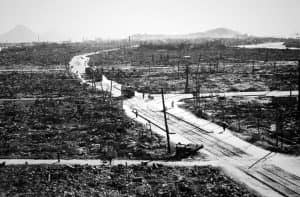by Anh Lê
The situation regarding the escalating tensions between North Korea and the United States must be addressed with negotiations with North Korea and peaceful diplomacy through the United Nations, not by saber-rattling, threats of war against North Korea, threats of pre-emptive strikes, and words by President Trump threatening North Korea with “fire and fury, like the world has never seen.”

After President Trump threatened to unleash on North Korea “fire and fury,” North Korea’s leader Kim Jong-un then threatened to target Guam as a potential target.
President Trump and the United States government should negotiate directly with North Korea’s leader Kim Jong-un and the government of North Korea, and both sides should tone down their rhetoric and seek peaceful resolutions.
Besides calling on the United Nations to find peaceful resolutions, the United States should work with China and Russia to assist with negotiations with North Korea.
Former President Jimmy Carter, who had visited North Korea in 1994, 2010 and 2011, and met with North Korea’s leader Kim Jong-il and government officials, issued a statement on Aug. 10 from the Carter Center calling on both North Korea and the United States to “restrain their warlike rhetoric” against each other and to work for peaceful resolutions.
President Trump and the United States government should negotiate directly with North Korea’s leader Kim Jong-un and the government of North Korea, and both sides should tone down their rhetoric and seek peaceful resolutions.
President Carter stated that in his talks with the North Koreans, North Korea communicated to him that it wants a permanent peace treaty to replace the 1953 ceasefire, to be assured that it would not be attacked by a pre-emptive war by the U.S. and for economic sanctions against North Korea to end.
President Carter stated, “A commitment to peace by the United States and North Korea is crucial. When this confrontational crisis is ended, the United States should be prepared to consummate a permanent treaty to replace the ceasefire of 1953. The United States should make this clear, to North Korea and to our allies.”
We must heed President Carter’s call. Both sides must work to achieve peace.
To go to war against North Korea would result in inferno, annihilation, and tragic and catastrophic consequences.
During the Viet Nam War, President Richard Nixon and National Security Advisor Henry Kissinger and their top advisers in 1969 discussed dropping nuclear bombs over North Viet Nam. Fortunately, their idea to employ nuclear bombs against the Vietnamese people was vetoed by Secretary of Defense Melvin Laird and Secretary of State William Rogers.
We must heed President Carter’s call. Both sides must work to achieve peace. To go to war against North Korea would result in inferno, annihilation, and tragic and catastrophic consequences.
Even as late as 1972, Nixon again discussed with Kissinger “dropping a nuclear bomb on North Viet Nam.”
According to historical evidence in the U.S. National Archives, on Dec. 4, 1972, Le Duc Tho, North Viet Nam’s chief negotiator at the Paris Peace Talks, said to Kissinger, that even when Nixon was vice president, “he had already proposed the use of nuclear weapons” on the Vietnamese during the French-Indochina War. Le Duc Tho told Kissinger that the Vietnamese were not going to be threatened into submission by such threats, either when Nixon was vice president or in 1972.
As we commemorate the Aug. 6 and 9 anniversaries of the U.S.’s dropping of nuclear bombs on Hiroshima and Nagasaki 73 years ago, let us renew our resolve to work for peace in our world.

In July, the Treaty on the Prohibition of Nuclear Weapons was ratified by 122 nations at a United Nations Conference. However, the United States, Russia, China, France, Israel, U.K, India and Pakistan, which have massive arsenals of nuclear weapons, did not participate in the conference.
Rev. Dr. Martin Luther King Jr. stated in December 1957, “It cannot be disputed that a full-scale nuclear war would be utterly catastrophic. Hundreds (of thousands) and millions of people would be killed outright by the blast and heat, and by the ionizing radiation produced at the instant of the explosion …
“Even countries not directly hit by bombs would suffer through global fall-out. All of this leads me to say that the principal objective of all nations must be the total abolition of war. War must be finally eliminated or the whole of mankind will be plunged into the abyss of annihilation.”
In a speech during a demonstration march against the war in Viet Nam in 1967, Dr. King stood at the United Nations Plaza in New York and condemned the Viet Nam War. Dr. King warned against the U.S. using nuclear weapons in Viet Nam. Nuclear warfare, Dr. King stated, would turn our earth into a hell that “even the mind of Dante could not imagine.”
As we commemorate the Aug. 6 and 9 anniversaries of the U.S.’s dropping of nuclear bombs on Hiroshima and Nagasaki 73 years ago, let us renew our resolve to work for peace in our world.
Let us renew our belief in the sanctity of human life. Let us work and pray for peace.
Copyright Anh Lê, August 2017. To contact the writer, email editor@sfbayview.com.





